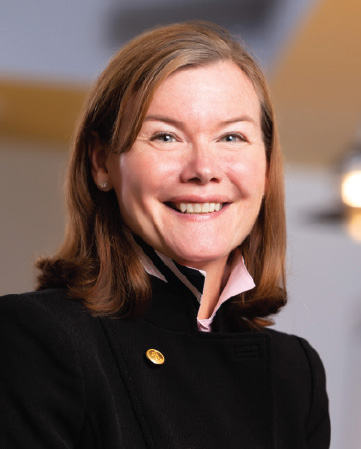High-Tech Startups Choose West Virginia
By Cathy Bonnstetter



West Virginia leaders have been putting together the pieces of an economic, high-tech, game-changing puzzle. By offering a myriad of networking opportunities, financial assistance and expertise, the state is encouraging high-tech dreamers and doers to call or keep the Mountain State their home.
“West Virginia is experiencing its broadest economic expansion in a decade,” says Marshall University president and former CEO of Intuit, Brad Smith. “The end of last year showed a quarterly growth of 7.3%, ranking us 10th in the nation. The state is successfully transitioning into the startup state we collectively envisioned—an innovation economy adopting artificial intelligence, green tech and digital health, among other tools. Our time has come, and this momentum is, in large part, due to a joint effort between the public, private and academic sectors to establish a business environment that is capital efficient, talent rich and policy friendly.”
Sarah Biller, executive director of Vantage Ventures, an initiative of the John Chambers School of Business and Economics at West Virginia University (WVU), says the state is the perfect place to spread your entrepreneurial wings.
“West Virginia is an unexpectedly awesome place to grow a startup,” she says. “We have numerous opportunities to grow our startup sector, from exposing our students to these exciting opportunities to enacting entrepreneurial-friendly legislation to attracting new investors.”
Vantage Ventures encourages high-tech entrepreneurs to amplify, innovate and redefine what is possible. The WVU initiative provides the support for high-tech startups that address the needs of a sizable market. Vantage opened its doors in 2019 and, so far, has onboarded 33 entrepreneurial companies.
In addition to Vantage Ventures, high-tech support is available through organizations such as TechConnect West Virginia, a nonprofit coalition advancing the innovation economy in the state; the West Virginia Small Business Development Center; and INNOVA Commercialization Group, an initiative of the High Technology Foundation.
INNOVA Group has placed more than $3.9 million in direct investments into 28 West Virginia companies. Other organizations have been working to organize investors, as well.
“West Virginia has a sizeable and collegial startup ecosystem that supports entrepreneurs,” Biller says. “Across the state, organizations like the West Virginia Jobs Investment Trust provide business mentorship and coaching. In increasing numbers, organizations like the Country Roads Angel Network, based in Beckley, and others are organizing investors to provide West Virginia startups access to funding.”
Dan Wright, DataRobot CEO, brought his high-tech company to Morgantown in 2012. He says even then, it was an easy choice. DataRobot set up a hub at the Vantage Ventures’ offices in 2021.
“I learned there was a unique opportunity here to create jobs in the rapidly growing technology field, as well as an exceptional talent pool and an inspiring future generation at WVU,” he says.
DataRobot provides companies with the artificial intelligence to manage the massive amounts of data available to them in order to deliver critical business insights. Throughout the pandemic, DataRobot has worked alongside the state’s COVID-19 task force.
“DataRobot has provided the daily reports on cases and hospitalizations that were used to help drive the state leadership’s responses and decision making,” Wright says. “Health care organizations throughout the state are continuing to use DataRobot to prepare for future variants or even pandemics.”
State officials are also using DataRobot’s artificial intelligence cloud platform to monitor more than $1 billion in credit card transactions to systematically identify fraud and abuse. Data management is just one technology sector taking root in the Mountain State.
“West Virginia has a very strong community of innovators and world-class capabilities to support startups in the medtech and health tech, data and the Internet of Things, energy, transportation and cybersecurity sectors,” Biller says. “We also have a growing fintech and digital gaming startup sector in the state.”
Biller acknowledges that statewide, movers and shakers as well as state institutions will need to adapt a new mindset to nurture these new companies.
“West Virginia can support startup efforts by becoming more agile in its thinking,” she says. “Whether systematically or because their market forces them to do so, startups often pursue a range of different approaches to solve problems. These pivots are not atypical in the startup world. West Virginia, in contrast, has grown its economy in a linear fashion, and our mental model of how businesses are built often draws heavily on these past experiences.”
John Chambers, former executive chairman of Cisco Systems and CEO of JC2 Ventures, says that a startup economy is the worthwhile outcome of the input of many sectors in the state that evolve and support each other.
“Startups will be the engine, along with working with large companies,” Chambers says. “This is the way we capture the heart and soul of young people, not just from our state but from all over the eastern half of the nation.”
This progression toward a startup economy means changes in the higher education focus. Those changes help to fuel the new economy as it grows and evolves.
“WVU becomes a school of opportunity to train the next generation of students—the next generation of startups,” Chamber says. “This becomes a self-fulfilling prophecy. It is the university reinventing itself; it is the startup ecosystem reinventing itself. It is the government at the state and local level sharing a common vision for what our state could be and will be in execution.”
Educational changes throughout the system, not just at the higher education level, can give young West Virginians the tools they need to jump into this new economics vertical.
“Our goal is to infuse the Silicon Valley techniques of agility and adaptability—known as design thinking—into our K-12 and post-secondary education system, growing the next generation of dreamers and doers who will then build the next great companies in West Virginia without the need to leave our state,” Smith says.
Although the state has to power through some growing pains to accommodate this new breed of entrepreneurs, Biller says we have some built-in qualities as West Virginians that are easing the transition.
“Our ability to convene the academic, private and public leadership together and use this collective force to support companies that are building breakthrough technologies is unrivaled anywhere in the country,” Biller says. “Our greatest strength is that we are pragmatists. We have applied this force to punch above our weight and attract globally significant startups to establish operations in West Virginia.”
Although the high-tech landscape is new in comparison to other economic sectors, the state is no longer at the starting block in the high-tech race.
“This is only the beginning of West Virginia’s transformation as a startup state,” Wright says. “More and more people are going to be talking about West Virginia in the same way they’re talking about Austin, Boston and other startup hubs around the country. West Virginia has been very welcoming, and my hope is that many more companies will want to come to the state. I like the idea of a new Silicon Valley in West Virginia, one that is accessible to an entirely new employee base with fresh perspectives and game-changing ideas.”
Chambers says a startup economy’s impact on the state will be positive and expansive.
“The impact will dramatically increase our average household income,” he says. “We have a much better chance for inclusiveness in the income gross. This will change education forever and the ability of business and government and the citizens of the state to work for a common goal. This was a dream five years ago. The dream is happening now. The question is: can we continue to have the confidence and the courage to go forward?”
The Startup Golden Era
Three diverse Morgantown startups—a company that repurposes lithium-ion batteries, a finance app and an environmental emissions tracking software company—all used West Virginia University’s (WVU) Vantage Ventures support to bring their high-tech ideas to market.
Auggie Chico, founder and CEO of Parthian Battery Solutions, won the West Virginia Business Plan Competition with his plan to reuse batteries that power electric cars when he was finishing his degree in finance in 2020 at WVU.
“Upon retirement of the vehicle, the batteries still have more than 85% of their life left,” he says.
Pitching the high-power batteries into a landfill causes high stakes environmental and safety concerns. Chico says that once the volatile batteries combust, they can burn for weeks.
Parthian Battery provides recertification services for lithium-ion batteries and manufactures stationary energy storage systems for homes and businesses that use solar panels. Parthian has developed pilot installations of its systems and partnered with Nissan North America.
When he began, Chico counted on the experts at Vantage Ventures for help with investor introductions and networking. Chico says Vantage introduced him to a community of entrepreneurial individuals in the state of West Virginia. Today, Chico is quickly moving toward his goal of having Parthian be the first line of retirement for lithium-ion batteries, and he has made it a point to do so in the Mountain State.
“West Virginia is changing into a state of opportunity. If you have some sort of vision or dream of starting something, you can do it right here,” he says. “Whether you are aware of it or not, opportunity is here. If you stick your toes in the water, it won’t be long before you start running into some of those opportunities.”
West Virginia’s participation in the FinTech Sandbox—a program cofounded by Vantage Ventures Executive Director Sara Biller that allows fintech technology startups to operate for 24 months without paying licensure fees—brought Jonathon Powers and his company, Nickel Finance, to the Mountain State. Founded in 2020, Nickel Finance now has dual headquarters in Pittsburgh and Morgantown.
“Financial technology startups have huge capital expenses just getting off the ground from licenses and consumer protections,” says Powers, Nickel Finance’s co-founder, COO and chief of strategic partnerships.
Nickel Finance’s goal is to make money management and movement easier for individuals and businesses with its mobile app, Nickel. The app creates a community of members who can move money with a responsiveness that turns every transaction into action.
“They say your network is your net worth,” Powers says. “Sarah Biller, Ellie Nesser and Tanya Smigocki have grown our network exponentially over the past year, introducing us to influential and affluent individuals in the state who can help propel us forward.”
Powers and Nickel continue to boost their momentum as they work with early adopters, such as Morgantown Brewing Company, and grow a wait list of potential users and their network of investors.
West Virginia natives Kyle Gillis and James Carnes began work on their high-tech company, Iconic Air, in 2018, while they were still students at WVU’s Statler College of Engineering and Mineral Resources.
Iconic Air supplies software that gives the world’s largest emitting industries the tools to track, analyze and reduce their emissions footprint.
“Our society is experiencing a shift in how we measure and evaluate environmental impact,” Gillis says. “For companies, this means monitoring your carbon footprint and climate risk is as important as tracking revenue.”
Recently, Gillis and Carnes raised more than $5 million to expand Iconic Air and support product development. Country Roads Angel Network, one of the company’s first investors, helped Iconic Air leverage the latest funding.
Iconic Air is a remote company with employees stretched across the U.S. However, with their Morgantown office, Gillis, a Wheeling, WV, native, and Carnes, a Weirton, WV, native, choose to maintain a strong state presence.
“Who wouldn’t want to work from a trendy mountain town but still have access to employees and networks available around the world?” Gillis says. “I think West Virginia is set up for a golden era.”



